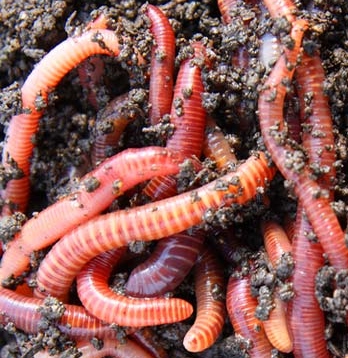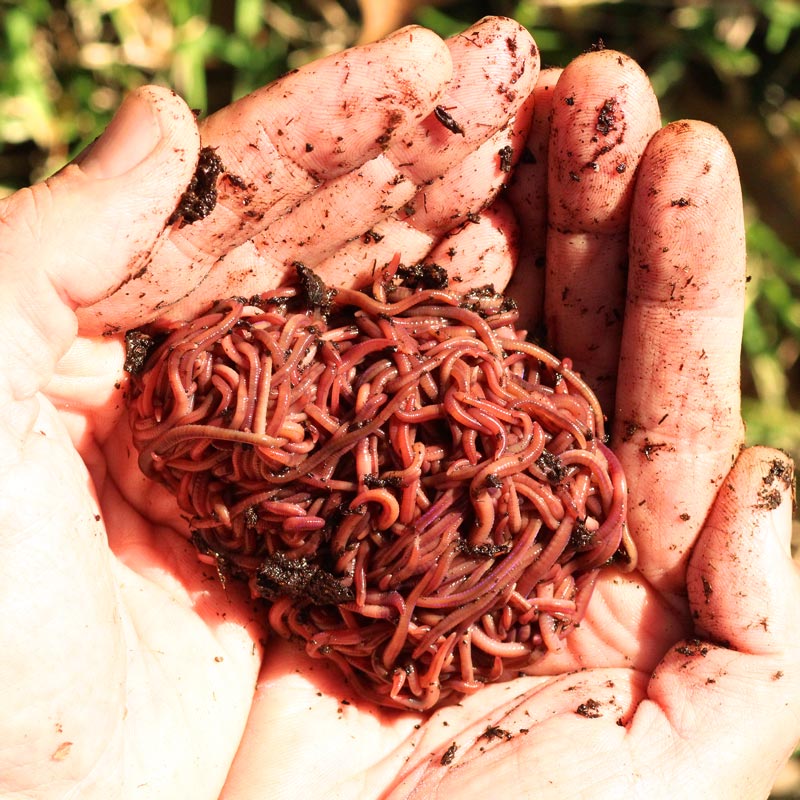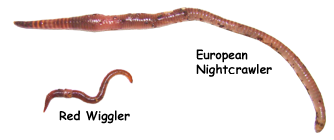Red Wiggler Worms - Effective Decomposers for Your Garden Compost Bin
Red Wiggler Worms - Effective Decomposers for Your Garden Compost Bin
Blog Article
Red Wiggler Worms Demystified: Opening the Keys of Vermiculture for Greener Living and Nutrient-Rich Dirt
In the realm of lasting methods for improving dirt quality and advertising eco-conscious living, red wiggler worms play an essential yet typically overlooked function. Red Wiggler Worms. Comprehending the intricacies of caring for these worms, maximizing their atmosphere, and utilizing their castings can lead to a greener way of living and much healthier dirt for plants to thrive.
The Duty of Red Wiggler Worms
Red Wiggler worms play an essential duty in composting systems by successfully damaging down raw material into nutrient-rich spreadings. These voracious eaters take in a selection of organic products, such as kitchen area scraps, yard waste, and paper items. As they feed, the worms' digestive system procedures damage down the organic issue right into a fine, dark, and nutrient-dense material known as worm spreadings or vermicompost.
The castings generated by Red Wiggler worms are extremely valuable for soil health and plant growth. They are abundant in important nutrients like potassium, phosphorus, and nitrogen, which are essential for supporting healthy plant growth. Furthermore, worm spreadings contain helpful microbes and enzymes that aid boost soil framework, increase water retention, and boost nutrient uptake by plants.
Advantages of Vermicomposting

Moreover, vermicompost, the nutrient-rich final result of vermicomposting, offers as an excellent organic fertilizer and dirt conditioner. It enhances soil structure, enhances soil aeration, and boosts dirt dampness retention. These residential or commercial properties add to much healthier plants with more powerful origin systems and far better resistance to bugs and illness. Vermicompost additionally improves the dirt with crucial nutrients like phosphorus, nitrogen, and potassium, advertising plant development and overall soil fertility.
In addition, vermicomposting assistances lasting gardening practices by providing a natural and chemical-free alternative to artificial fertilizers. Red Wiggler Worms. This eco friendly strategy not only improves the soil yet also helps minimize dependence on damaging chemicals, advertising a greener and more sustainable means of horticulture
Setting Up a Worm Container
When developing a worm container for vermicomposting, proper configuration is critical to guarantee the success of the composting procedure. The initial step in establishing up a worm container is choosing an ideal container. This can be a plastic bin or wooden box that gives sufficient space for the worms to move and has correct drain holes to stop waterlogging. Next off, a bed linen material such as shredded paper, cardboard, or coconut coir should be contributed to the container. This bed linens offers a comfy setting for the worms and helps maintain dampness degrees.
After adding the bedding, present the red wiggler worms to the bin. It is recommended to start with a tiny number of worms and progressively boost as they multiply. navigate to this website The worms need to after that be offered with food scraps such as vegetables and fruit peels, coffee premises, and eggshells. It is necessary to stay clear of including meat, dairy, oily, or salted foods to protect against attracting parasites and developing unpleasant odors.
Frequently check the dampness degrees and temperature in the worm container to make sure ideal conditions for the worms. With correct configuration and maintenance, the worm bin will efficiently transform organic waste into nutrient-rich compost for your plants and garden.
Gathering Worm Spreadings
To effectively accumulate nutrient-rich worm castings from your vermicomposting system, a methodical harvesting method is necessary. There are a couple of key actions to comply with to ensure a successful procedure when it comes time to harvest the worm castings. First of all, quit adding fresh food scraps to one side of the worm bin for a number of weeks prior to harvesting. This encourages the worms to move to the side with fresh bedding and food, making it less complicated to dig the spreadings from the opposite side.

Troubleshooting Common Issues
Identifying and attending to common obstacles that may arise during the vermicomposting procedure is vital for preserving a healthy and balanced and efficient more worm bin. Adding excess food scraps can lead to a build-up of wetness and level of acidity in the worm bin, possibly harming the worms. An additional problem is unpleasant smells emanating from the worm container.
Additionally, if the worm populace is declining or the worms show up unhealthy, maybe because of ecological stressors such as extreme temperature levels or pH levels. Monitoring these variables and making needed adjustments is crucial for the wellness of the worms. By fixing these common concerns sites immediately, vermicomposters can guarantee a smooth and successful vermicomposting process while maintaining a thriving worm populace.

Conclusion
To conclude, red wiggler worms play a critical function in vermiculture by breaking down raw material right into nutrient-rich dirt. The benefits of vermiculture include greener living and boosted soil top quality. Setting up a worm container is important for successful vermiculture, and gathering worm spreadings supplies important compost for horticulture. By comprehending and fixing common issues, people can open the tricks of vermiculture for sustainable living and healthier soil.
As they feed, the worms' digestion procedures break down the natural matter right into a fine, dark, and nutrient-dense material understood as worm spreadings or vermicompost.
The castings created by Red Wiggler worms are very advantageous for soil wellness and plant growth. Adding excess food scraps can lead to a build-up of dampness and acidity in the worm bin, possibly hurting the worms.Additionally, if the worm population is decreasing or the worms appear unhealthy, it can be due to environmental stressors such as severe temperature levels or pH levels. Setting up a worm container is essential for effective vermiculture, and collecting worm spreadings gives beneficial garden compost for gardening.
Report this page